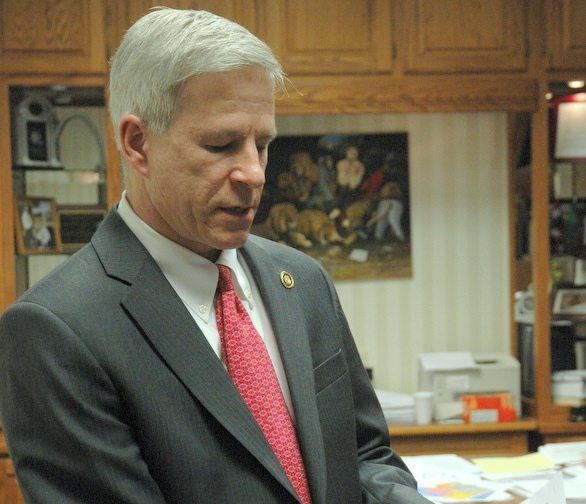
May 5, 2017; Kansas City Star
Jeff Stuerman, campaign manager for Missouri Governor Eric Gretiens, started the nonprofit A New Missouri, Inc. in February. On the surface, the group is similar to other social welfare organizations in that the IRS recognizes it as a 501(c)(4), meaning the nonprofit that can collect non-deductible donations but is not required to disclose donors and is not subject to Missouri’s campaign contribution limits. However, A New Missouri is responsible for releasing radio ads, digital ads, and robocalls attacking Republican State Senator Rob Schaaf by giving out his personal phone number. This move seems to be in direct response to Schaaf’s stance on managed care.
A New Missouri’s attack on Schaaf briefly revitalized the bill Schaaf filed in December requiring 501(c)(4) “dark money” organizations to disclose donors’ names. Schaaf, joined by Republican State Senators Gary Romine and Doug Libla and Democrat State Senator Jason Holsman, threatened to halt debate on any non-budget bill until his bill got a hearing approved, which it finally did last week. The bill was filibustered on the senate floor by Republican senators and supporters ultimately withdrew the bill from consideration. It is possible, but unlikely, that the bill will be considered again before the state legislature ends its annual session later this week.
The actions of A New Missouri have brought ethics reform back to center stage.
Governors do not usually attack state legislators of their own party. Greitens claims to disagree with A New Missouri’s actions, insists he has little influence on the organization, and denies having a role at the organization. But, A New Missouri is housed in a building owned by one of Greitens’ largest donors and is run by his senior adviser, Austin Chambers. His campaign finance director, Meredith Gibbons, and his sister-in-law both work out of this office as well.
Sign up for our free newsletters
Subscribe to NPQ's newsletters to have our top stories delivered directly to your inbox.
By signing up, you agree to our privacy policy and terms of use, and to receive messages from NPQ and our partners.
IRS regulations stipulate that 501(c)(4)s must be operated exclusively to promote social welfare, but this definition is vague and open to interpretation. The Internal Revenue Code places fewer restrictions on 501(c)(4) groups than on 501(c)(3) charities, allowing them to lobby more extensively to promote their organizations’ missions. 501(c)(4)s can also engage in political activity and donate money and time to specific campaigns, though it cannot be their “primary activity.” The definitions of “exclusively” and “primary activity” are open to interpretation, as the U.S. Treasury Department and the IRS have not issued regulations formally defining the terms.
This calls into question what A New Missouri’s primary activity is. The organization’s use of strongman tactics to bully state legislators during session is of concern. It is one thing to support candidates financially or assist with their campaigns; it is another for a nonprofit to disclose a politician’s private cell phone number and demand the public call it. This type of activity might become the norm if left unchecked.
Revealing the funding of 501(c)(4)s could specifically bring to light the organizations or individuals promoting the managed care issue, but more importantly, it would allow Missouri citizens to determine if there is undue influence on elected officials at large. The bill would only affect those organizations that engage in political activity and donate more than $5,000. Those opposing the bill believe that donor disclosures put individuals and businesses at risk of harassment and boycotts. Also yet to be resolved is the thorny issue of whether the federally guaranteed donor confidentiality given to 501(c)(4) organizations may be breached by states administering their election processes.
Ironically, in his campaign for governor, Greitens made ethics reform a priority, blaming “career politicians” for ethical concerns in Jefferson City. Missouri is not the only state to push for such reform. Colorado’s House Bill 1262 was a similar attempt and although it did not pass, brings to the forefront the need for transparency and accountability from not only legislators, but from 501(c)(4)s— Suja S. Amir and Michael Wyland













